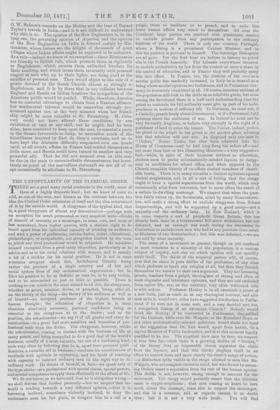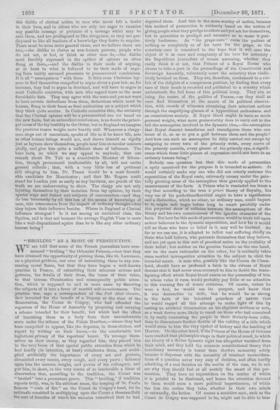THE UNPOPULARITY OF THE CLERICAL ORDER.
TEIERE are a good many social contrasts in the world, some of them of a highly dramatic kind ; but we know of none so odd, so out-of-the-way, and bizarre as the contrast between the idea the Clerical Order entertains of itself and the idea entertained of it by the outside world. A clergyman of the typical kind, that is, a good clergyman of almost any denomination—perhaps with an exception for much persecuted or very sceptical sects—thinks of himself of necessity as a messenger, in some sort, and more or less accredited, from higher powers, with a distinct right to be heard apart from his individual capacity of securing an audience, and with a power of performing certain duties, moral, educational, philanthropic, or sympathetic, not altogether limited by the tests to,which any rival professional would be subjected. Re considers himself exempted from a good many etiquettes, particularly as to advice and as to his social relations with women, and is usually a bit of a stickler for his social position. He is not in most Countries arrogant about this, Archdeacon Grandy being rather the product of a single country and of law and social system than of any ecclesiastical organization ; but he likes his position to be as definite as may be, to be very visible, and to be encroached on just as little as possible. There is nothing to our minds in the least absurd in all this, the clergyman, whether as priest, minister, divine, or preacher, being, after all, on the theory of the thing—the theory of his audience as well as of himself—an accepted professor of the highest branch of human thought ; the relaxation of etiquettes is in most churches absolutely necessary, personal confidence being as essential to the 'clergyman as to the doctor ; and as for position, the schoolmaster—we say it of all grades and every de- nomination—is a great deal more sensitive and tenacious of pro- fessional rank than the divine. The clergyman, however, unlike the schoolmaster, corning in contact with the business of life at many points, and being compelled to do a good deal of the world's business, usually of a most valuable, but not of a hardening kind, ends very often by believing that he is, apart from personal quali- fications, a valuable aid in business,—confuses his consciousness of rectitude with aptitude in cyphering, and his habit of teaching with capacity to instruct ordinary men in the right way to do ordinary work. He thinks of himself, in fact—we speak only of the type-cleric—as a professional with special claims, special powers, and special competence to apply them effectually to the affairs of life.
We do not know, as we have said, that he is altogether wrong— we shall discuss that further presently—but we suspect that the world is tending towards a very different opinion,—that it is becoming inclined, sometimes violently inclined, to deny the ecclesiastic even his fair place, to relegate him to a cell or a
pulpit, there to meditate or to preach, and to make him leave hutnaa affairs very much to themselves. All over the Continent large parties are resolved with passionate resolve to exclude priests from any participation in the ordinary business of the world. There is only one country, Portugal, where a Bishop is a prominent Cabinet Minister, and this his position is personal to himself. The Sovereign Bishoprics are all gone. For the first time we believe in history no priest sits in the French Assembly. The Liberals everywhere threaten to exclude ecclesiastics by law from the control or even a share in the control of education, and in France they will probably carry this into effect. Ia France, too, the distrust of the card as a secular guide has markedly increased, in Italy he is treated as a being whose secular opinions are foolishness, and in Protestant Ger- many he is scarcely considered at all. Of course, immense sections of the population still look to the cleric as an infallible guide, but even among the devotional there is a half-tacit understanding that the priest to maintain his full authority must give up part of his inde- pendence in matters of ordinary life. In Germany, he must not, if a Catholic, preach freely about Government; or if a Protestant, hold opinions about the sinfulness of war. In Ireland he must not be very fervently Anglican, or believe very strongly in the right of a purchaser of land to evict the tenant. The Fenian, indeed, prefers his priest in the pulpit to his priest in the market-place advising him that rebellion will not win. In England only one man in " Orders," Horne Tooke, has ever been admitted into the House of Commons—and he had long flung his orders off—and not more than four or five Dissenting Ministers—a very suggestive fact—while, in spite of their iinineuse services to education,, electors seem to prefer ecclesiastically-minded laymen to clergy- men as candidates for school office, and when opposed to the Church complain bitterly of ex-officio clerical members of charit- able trusts. There is in many counties a distinct agitation againet clerical magistrates, and in all a sort of feeling that the clergy ought to have a special separateness from the world, which may occasionally arise from reverence, but is more of teu the result of a certain in-dwelling contempt. We suspect that when the ques- tion fairly comes up, the Secularists, aided by many Nonconform-
ists, will make a strong effort to exclude clergymen from School Inspectorships, and will be supported by a good many—not a majority—of the ordinary laity. In New Zealand, which is in some respects a sort of prophetic Great Britain, this has already been done in a Government Bill since withdrawn but not defeated, and an attempt was made during the discussion ha Committee to exclude even men who had at any previous time acted as Ministers of any denomination ; but this was defeated,—we are not told by what majority.
The cause of a movement so general, though as yet confined in most countries to a minority of the population, is a curious subject of inquiry, and one on which opinion will not speedily settle itself. The chiefs of the sceptical parties will, of course, aver that its cause is pure dislike of the profession, of any class which professes to teach any religion at all, but then they furnish themselves the answer to their own argument. They are becoming priests, teachers from a pulpit, theologians of strong and often of most dogmatic and intolerant opinions, and they are not excluded from active life, are, on the contrary, very often welcomed into it with ardour. Professor Huxley is in all essentials a priest of a new faith, just as much so as any theological lecturer, arid able man as he is, would two cities have suggested his election to Parlia- ment if he were not in some sort, and a very decided sort too, a recognized Bishop of an extensive Church? Nobody would thiuk Mr. Huxley, if he succeeded in Parliament, disqualified for the Cabinet, while even Mr. Walpole, or Mr. Beresford Hope, or any other ecclesiastically-minded politician would shake his head at the suggestion that Dr. Tait would, apart from health, be a capital Minister of Public Instruction, and is at this moment legally qualified to be one. The sceptical view may be true, we suspect is true thus far,—that there is a growing dislike of " Orders," of the theory that an impassable chasm separates the (Aerie from the layman, arid that this dislike displays itself in tm effort to narrow more and more closely the cleric's range of action, --3 distinction quite visible in the range allowed to men like Mr. Walpole, who are complete clerics in mind, but who do not by assum- ing Orders assert a separation from the rest of the human species. This dislike is not, however, strong enough to account for the movement. The clergy would probably assert that the ultimate cause is crypto-scepticiain ; that men ceasing at heart to care much about the message, cease also to respect the messenger, and this in a measure, and as regards classes, is no doubt true ; but it is not a very wide truth. You will find
this dislike of clerical action in men who never felt a doubt in their lives, and in others who are only too eager to examine any possible message or pretence of a message which may be sent them, and are predisposed to like clergymen, as they are pre- disposed to like all teachers of a knowledge they desire to acquire. There must be some more general cause, and we believe there are two,—the dislike to clerics as non-human persons, people who do not act, or feel, or think as other men do,—the dislike most forcibly expressed in the epithet of epicene so often flung at them,—and the dislike to their mode of arguing, or at least to what is believed to be their mode of argu- ing from tacitly assumed promisses to preconceived conclusions. It is all " assumpsimus " with them. It frets even Christian lay- men to find themselves compelled to argue about a poor law, as, for instance, they had to argue in Scotland, and will have to argue in most Catholic countries, with men who regard texts as the most formidable data. They may agree with the texts and yet not want to have certain deductions from them, deductions which must be human, flung in their faces as final authorities on a subject which they think quite secular. In Catholic countries this, the certainty that the Clerical opinion will be a preconceived one not based on the new facts, but on antecedent conclusions, is no doubt the princi- pal cause of the lay hostility to the Order, but in England we imagine the previous reason weighs more heavily still. Whenever a clergy- man steps out of canonicals, speaks of life as if he knew life, acts as other human beings would act, and shows himself as rigidly just as laymen show themselves, people hear him on secular matters gladly, and give him quite a sufficient share of influence. The bare facts, on which we may appeal to anybody, that our remark about Dr. Tait as a conceivable Minister of Educa- tion, though pronounced inadmissible by all, will not excite general ridicule ; that, with a very little less of petticoat still clinging to him, Dr. Fraser would be a most formid- able candidate for Manchester ; and that Mr. Rogers could stand for London just as easily as any barrister, are proofs of the truth we are endeavouring to show. The clergy are not only injuring themselves by their isolation from lay opinion, by their special ways and dialect and subjects of conversation—and they do lose immensely by all this lose of the means of knowledge of men, this retrocession from the impact of ordinary thought—but they injure their influence besides. Where in England is Clerical influence strongest ? Is it not among an unclerical class, the Squires, and is that not because the average English Vicar is more like a well-dispositioned squire than he is like any other ordinary human being ?



































 Previous page
Previous page